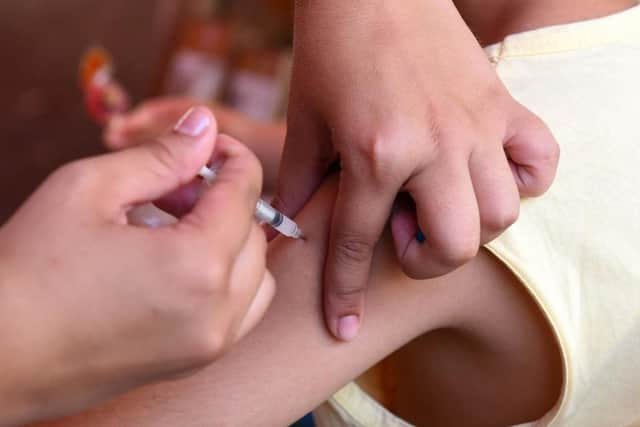Urgent warning to parents over deadly meningitis threat to schoolchildren
and live on Freeview channel 276
The vaccine protects children against the bacteria which lead to the infections, but many aren't immunised, the UK Health Security Agency (UKHSA) has said.
Data published by UKHSA shows that uptake of the vaccines offered to 13 and 14 year olds who were in school Year 9 during the 2021 to 2022 academic year has fallen, leaving many young people unprotected from life-threatening diseases.
Advertisement
Hide AdAdvertisement
Hide AdThe teenage (Td/IPV) booster is the last routine dose for tetanus, diphtheria and polio, and provides young people with long-lasting protection into adulthood.


The MenACWY vaccine helps protect young people against four types of meningococcal disease (which cause meningitis and blood poisoning).
Although rare, they ar serious diseases can cause life-threatening illness leading to hospitalisation, permanent disability and even death.
Uptake of the Td/IPV and MenACWY vaccines for children in school Year 9 was 69%, around seven per cent lower than the previous year and well below pre-pandemic levels.
Advertisement
Hide AdAdvertisement
Hide AdThe data suggests that the NHS has already caught up many children who missed out on their vaccines, with uptake improving to around 80% for children in Year 10.
UKHSA is now urging parents and guardians to ensure eligible young people are up to date with their vaccines before they leave school.
Dr Vanessa Saliba, Consultant Epidemiologist at UKHSA, said: “Vaccines protecting against tetanus, diphtheria, polio and meningococcal disease are offered to young people in school Year 9 and are being delivered in schools right now.
"In recent years we have seen vaccine uptake fall due to the challenges posed by the pandemic. Many young people who missed out on their vaccinations have already been caught up, but more needs to be done to ensure all those eligible are vaccinated.
Advertisement
Hide AdAdvertisement
Hide Ad“Children and young people who have missed out on their teenage vaccines should contact their school nurse, school immunisation team or GP surgery to arrange a catch-up.
“These vaccines offer the best protection as young people start their journey into adulthood and mixing more widely – whether going to college, starting work, travelling or going to summer festivals.
If your child is due for a vaccination, you don’t need to wait to be contacted – speak to your school nurse, school immunisation team or GP surgery to book an appointment.
Steve Russell, National Director for Vaccination and Screening, said: “The 3-in-1 teenage booster and the MenACWY vaccination are extremely well-researched and proven to provide protection against a range of diseases that can cause serious illness.
Advertisement
Hide AdAdvertisement
Hide Ad"NHS School Aged Immunisation Services offer these vaccinations in secondary schools, as well as the HPV vaccination that protects against a range of cancers and we strongly urge those eligible and their family members and guardians to ensure they are up to date, and if not to come forward for their vaccines as soon as possible – it’s the best way to keep you protected.”
MENINGITIS is an infection of the protective membranes that surround the brain and spinal cord.
While it can affect people of any age, it is most common in babies, children, teenagers and young adults.
It can be very serious if not treated quickly, and it can cause life-threatening blood poisoning (sepsis) and result in permanent brain or nerve damage.
Advertisement
Hide AdAdvertisement
Hide AdIt is usually caused by a bacterial or viral infection, which can be spread through sneezing, coughing and kissing.
Several vaccines - including MenB, 6-in-1, pneumococcal, Hib/MenC, MMR and MenACWY - offer some protection against meningitis.
Symptoms develop suddenly and can include a high temperature (fever), being sick, a headache, a rash that does not fade when a glass is rolled over it (but a rash will not always develop), a stiff neck, a dislike of bright lights
drowsiness or unresponsiveness, seizures (fits).
If you think you or someone you look after could have meningitis or sepsis, call 999 or go to your closest A&E immediately.